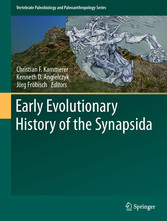Suchen und Finden
Early Evolutionary History of the Synapsida
Non-mammalian synapsids were the dominant terrestrial vertebrates from the Late Carboniferous to the Middle Triassic and play a key role in understanding the origin and evolution of mammals. Despite these facts and the outstanding fossil record of the group, early synapsids remain obscure. This book showcases the full breadth of contemporary research on non-mammalian synapsids, ranging from taxonomy and phylogenetics to functional morphology, biogeography, paleoecology, and patterns of diversity. It also underscores the importance and potential of studying non-mammalian synapsid paleobiology in its own right, not just in the context of mammalian evolution.
Christian F. Kammerer received his B.A. in Biological Sciences and his M.S. and PhD. in Evolutionary Biology from the University of Chicago. He has studied as a postdoctoral fellow at the American Museum of Natural History, New York and the Museum für Naturkunde, Berlin. His research focuses on the systematics of Permo-Triassic synapsids and the evolutionary processes underlying the origin of mammals.
Kenneth D. Angielczyk received a B.S. in Biology and Geology from the University of Michigan and a PhD. In Integrative Biology from the University of California, Berkeley. In 2007, After working as a postdoctoral researcher at the California Academy of Sciences and the University of Bristol, he was appointed as the Assistant Curator of Paleomammalogy at the Field Museum of Natural History. His research focuses on the taxonomy, phylogenetics, paleobiology, and paleoecology of dicynodont therapsids, and how terrestrial tetrapod communities were affected by the end-Permian mass extinction.
Jörg Fröbisch is Professor for Paleobiology and Evolution at the Humboldt Universität and Museum für Naturkunde in Berlin. He received a Diplom (M.Sc. equivalent) in Geology/Paleontology from the Rheinische Friedrich-Wilhelms-Universität Bonn and a PhD. in Ecology and Evolutionary Biology from the University of Toronto. His research focuses on the patterns of diversification, phylogeny, and paleobiology of synapsids, as well as trends in the evolution of terrestrial ecosystems and the impact of mass extinction events on terrestrial vertebrate ecosystems.
Alle Preise verstehen sich inklusive der gesetzlichen MwSt.









